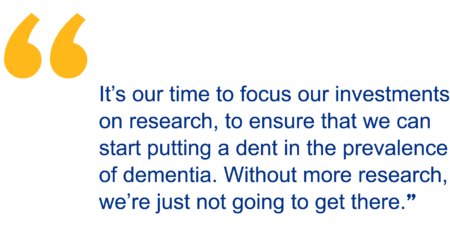
Let’s talk about research
Today, I’m reaching out because I want to know what you think about dementia research in Canada.
Your own experience and the wisdom of your insights can help the Alzheimer Society amplify the voices of people like you – ensuring that these voices are heard and action is taken. I hope you will join the conversation.
Since coming on board as CEO, the goodwill, expressions of support and advice from individuals across the country have been heartwarming and deeply appreciated.
Key things I’ve learned so far:
- Canadians are among the world’s top researchers conducting research on Alzheimer’s disease and other forms of dementia.
- Current research is twofold: Biomedical focuses on the science, improving detection and finding disease-altering treatments, while quality-of-life research focuses on improving day-to-day care for those already living with dementia.
- The cornerstone of the Alzheimer Society’s research investments is the Alzheimer Society Research Program, which funds grants and awards to move biomedical and quality-of-life research forward.
- However, dementia research is grossly underfunded in Canada, crippling the pace of progress despite an exponential increase in the number of people with dementia and its terrible impact.
- We need a greater sense of urgency to mobilize support for more research, enabling faster progress toward therapies.
One point really stands out for me – how big the challenge of dementia is and how fast that challenge is growing. This is not a tomorrow problem for Canada. It’s our problem today!
What is surprising – and yes, frustrating – is the chronic underfunding of research and how we keep ignoring the consequences of inaction.

As the daughter and caregiver to a woman living with late stage vascular dementia, early on I came to appreciate the assistance the Alzheimer Society has to offer to caregivers and people like my Mother.
It also became evident that the health-care system is limited in the ways it can help those with dementia. Available medications can only treat the symptoms. There is nothing out there yet that will alter the course of the disease.
This firsthand experience on the client side, I believe, helps me better serve the Society in our work.
It gives me a deep respect for the courage of fellow Canadians who face the challenges of living with dementia on a daily basis. And I feel a heartfelt empathy for their caregivers whose support ensures those with dementia are not facing the disease alone.
My personal experience also gives me a greater appreciation for the importance, indeed the clear necessity, of the Alzheimer Society’s leadership role.
I learned a lot during my first year about progress on the research front from our researchers and other experts. It soon became apparent, though, that Canada is lagging behind. As our population ages, we are unprepared for the rapid rise in the number of people with dementia.
Recently, we conducted regional consultations with people living with dementia to inform an urgently needed national dementia strategy. That strategy will address both the need for disease-altering treatments and the immediate needs of those now living with dementia.
In the meantime, our long-term care system is bursting at the seams in every province. The home-care system just cannot keep up. And family caregivers are being pushed to the breaking point because they can’t get their family members the care that is needed. It’s heartbreaking.
With your participation, whatever form it takes, we can help instill through education a greater sense of urgency in the minds of Canadians about the need for more dementia research.
It is all the more important, then, that I hear back from you to ensure your voice is heard. I look forward to hearing what you think about these issues. Together, we are stronger.
Warm regards,
Pauline Tardif
P.S. Did you know? The Alzheimer Society now has a more prominent voice at the table. I’ve been appointed, in my position as CEO, co-chair of the Ministerial Advisory Board on Dementia.
The Board will work with the federal Minister of Health, Ginette Petitpas Taylor, on matters related to the health of Canadians living with dementia as the Government of Canada begins to develop a national dementia strategy. All the more important that I hear back from you soon to ensure your voice is heard.